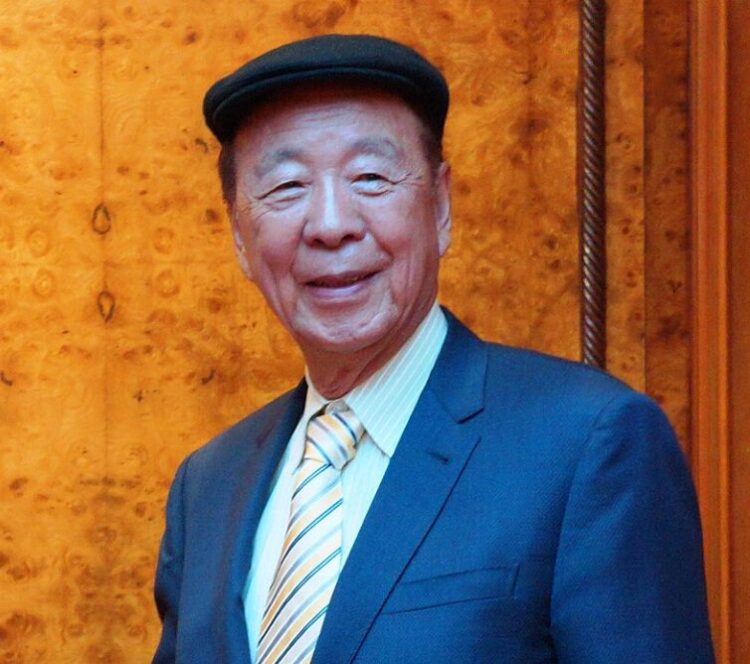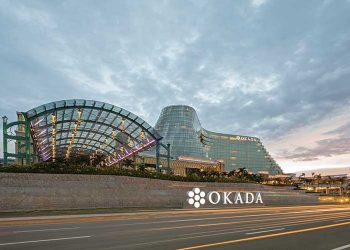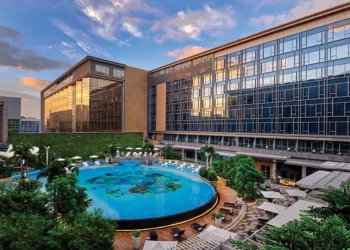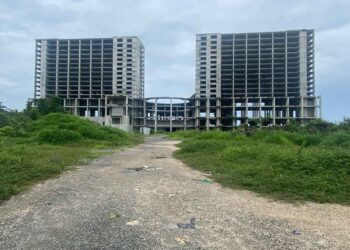From street vendor to gaming tycoon, Galaxy Entertainment Group founder Dr Lui Che Woo concluded his splendid journey of 95 years on earth on 7 November 2024. Recounting Dr Lui’s legendary life, Inside Asian Gaming revisits Dr Lui’s steps towards the creation of his business empire.
Unlike the two late “Kings of Gambling”, Stanley Ho and Sheldon Adelson, Lui Che Woo entered the gaming industry at the age of 73, a field he had not been involved in during the first three-quarters of his life.
As he mentioned in his only authorized autobiography, Lui Che Woo: A Memoir, published in Chinese in Hong Kong in 2015, “Doing business is not like casting a fisherman’s net; it is about planting your feet firmly as you step into a new industry.”
Dr Lui’s uncanny ability to seize opportunities propelled him to tycoon status in mining, hospitality, gaming and other sectors.
Having survived the Japanese invasion of China, Dr Lui’s journey is a veritable rags-to-riches tale, and one punctuated with numerous trials and tribulations, twists and turns.
Lui Che Woo was born in 1929 into a wealthy family in Jiangmen, Guangdong. His great-grandfather, Lui Tak Ying, left his hometown for the United States at the age of 15 to seek a better life. After years of hard work, he became the largest Chinese supplier in the import-export business in the United States, earning a place as a heroic figure in Lui Che Woo’s heart.
Lui Che Woo’s father, Lui Kam Chuen, spent many years traveling with his own father, and later decided to return to mainland China to establish his own ventures, including founding a winery. Born into a business-oriented family, Lui Che Woo enjoyed a wealthy lifestyle in his early years. However, with the outbreak of the Sino-Japanese War, eight-year-old Lui fled with his father to Hong Kong, where he began a new chapter in life. After graduating from high school, he started learning the ropes of business, helping manage the family’s food wholesale and garment factory enterprises.

The King of Minerals
However, the good times were short-lived. Following the outbreak of the Pacific War, Hong Kong soon fell, and the family business vanished overnight. Despite these setbacks, Lui Che Woo’s fighting spirit remained unshaken. The adversity only fueled his determination to rise again. During the Sino-Japanese War, Lui noticed a severe shortage of cooking oil and flour in Hong Kong, both essential ingredients in food production. To address this issue, he devised a method of using tapioca flour to make rice noodle sheets, inventing a new way to produce the popular fried egg noodle snack. In just over three years, he earned millions in military currency through this innovative approach.
However, after the Sino-Japanese War ended in 1945 and Japan became a defeated nation, those millions in military currency Lui Che Woo had accumulated turned into worthless paper, wiping out years of wealth in an instant. This marked the first business catastrophe for Lui himself, but rather than succumbing to despair, Lui used it as a valuable lesson, learning to assess situations with keen insight.
After the war, the food business was no longer prosperous. Lui shifted to international trade, accumulating capital by dealing in machinery and automobiles. By the late 1950s, he acquired an excavator from a mining company and noticed that Hong Kong’s infrastructure was rapidly developing, with a growing demand for sand and gravel. This observation led him to enter the mining industry.
He gradually purchased machinery for mining and successfully obtained a mining site from the Hong Kong government to develop his stone mining business. At the time, many quarries in Hong Kong still relied on manual labor, but Lui’s use of mechanized mining reduced costs and improved efficiency, quickly boosting his business.

Thanks to his outstanding business acumen, his reputation spread rapidly within the mining industry, and he was soon known as the “King of Minerals.” The company he had founded in 1955, K. Wah Group, thrived. It was the first to obtain a mining license in Hong Kong, when in 1964 he successfully bid for the mining rights of the Anderson Road Quarry in Kowloon.
Simultaneously, he ventured into real estate, foreseeing Hong Kong’s rise as a shopping paradise, and extended his reach into the hotel industry. He invested HK$68 million to acquire a plot of land in Tsim Sha Tsui East, where he built the five-star Holiday Inn Harbour View, now known as InterContinental Grand Stanford Hong Kong.
To this day, the conglomerate founded by Lui Che Woo, K. Wah Group, owns over 200 subsidiaries and 20 hotels. In 1998, the firm was regarded as the 12th largest hotel conglomerate in the United States, establishing Lui as a hotel tycoon, to add to his tycoon status in other sectors.
Dark Horse in the Gaming License Race
Lui Che Woo had already attained great success in the hotel and property investment sectors before any thought of venturing into Macau’s gaming industry. In 2002 the Macau government no longer held its appetite for allowing the Stanley Ho family to hold a monopoly on operating gaming businesses, and it launched a public tender to award three new gaming licenses. The breaking of the sole concession into three attracted gaming moguls across the planet to vie for the new licenses. Since Lui had no experience in operating casinos, the market did not see him having much of a chance to win one of the coveted three seats.
But two days before the Macau government announced the public tender results, Venetian Macau dramatically withdrew from its partnership with Taiwan-based Asian American Entertainment Corp. The Macau SAR government’s tender committee had expressed their positive recognition of Venetian’s proposal to develop a Venetian Macau property with MICE and casino space but frowned upon their Taiwanese partner.
 Venetian turned to Lui Che Woo for cooperation, and together they competed for a gaming license through Lui’s Galaxy Entertainment Group (GEG). Against the odds, GEG emerged as the dark horse in the 2002 casino license tender. Some speculated that this outcome was due to the central government’s political considerations, as choosing a Hong Kong-funded enterprise was seen as a safer option than one with Taiwanese connections, especially given that Lui Che Woo was at that time a member of the Chinese People’s Political Consultative Conference (CPPCC).
Venetian turned to Lui Che Woo for cooperation, and together they competed for a gaming license through Lui’s Galaxy Entertainment Group (GEG). Against the odds, GEG emerged as the dark horse in the 2002 casino license tender. Some speculated that this outcome was due to the central government’s political considerations, as choosing a Hong Kong-funded enterprise was seen as a safer option than one with Taiwanese connections, especially given that Lui Che Woo was at that time a member of the Chinese People’s Political Consultative Conference (CPPCC).
However, the simple truth is that Lui Che Woo’s capabilities were more than sufficient for the task. Sheldon Adelson, founder of Las Vegas Sands and ultimately Lui Che Woo’s leading competitor in Macau, once praised, “Under Lui Che Woo’s leadership, Galaxy Entertainment has significant strength in both management and construction, and will definitely lead Macau in its development into a gaming, tourism and MICE city of the world.”
The partnership between Venetian and Galaxy only lasted a year before they parted. In December of that year, negotiations with the Macau government ultimately led to each of the three new gaming licenses being “sub-concessioned” once, turning the three original casino concessions into six. After the separation of Lui Che Woo and Venetian, the two operated their own casinos independently.
A battle well-fought
Following the SARS outbreak in 2003, mainland China started allowing residents to visit Macau under the Individual Visit Scheme (IVS), driving the rapid ascent of the SAR’s gaming industry. But few in the market were positive about GEG’s prospects at the time due to its lack of gaming industry experience. However, as the contest for gaming concessions finally settled, the company expanded swiftly. On 4 July 2004, GEG opened its first casino property, Galaxy Waldo Hotel, by investing MOP$500 million on revamping an unfinished commercial building. The 16-story Waldo Hotel had a three-story underground carpark and included 23 gaming tables and 83 slot machines in its first phase.
In April 2005, Lui Che Woo successfully took Galaxy Entertainment public. The Lui family held a 73.6% stake in the company. In just three short years, Lui had personally invested approximately HK$612 million, yet, in what can only be described as a brilliant business move in transforming Galaxy into a publicly listed company, he received stocks and interest-bearing bonds valued at HK$13.8 billion, with a personal paper profit of approximately HK$13.2 billion.
The year 2006 saw the apex of GEG’s property launch on the Macau peninsula, with four properties opening that year. At the beginning of the year, agreement was reached with Loi Keong Kuong, the President of Rio Hotel, to open the Rio Casino. On 27 April, the 5,500-square-metre President Casino was launched. This was followed on 29 September by Grand Waldo Hotel and Casino (later renovated into Broadway Macau), which was Macau’s largest integrated family-entertainment and leisure complex at the time, and the first integrated casino and resort in Cotai. This signaled GEG’s first arrival at Cotai with its entertainment business and laid the foundation for the core of Macau’s gaming sector migration from the Macau peninsula to Cotai.
On 19 October that same year, after more than two years of construction, the StarWorld Hotel, located in the prime area of NAPE, officially opened. The hotel offered 500 rooms, with a gaming area spanning 140,000 square feet and nearly 300 gaming tables.

The launch of StarWorld opened a new chapter for GEG under the leadership of Lui Che Woo. He remarked during the opening ceremony of the hotel, “The gaming industry of Macau has reached the stage of diversification … We are providing all guests with superb high-quality service, which renders us fearless in facing any competition and will propel us to become the strongest among the strong.”
Business Upsurge
Following its establishment in 2004, Sands Macao experienced strong growth in the mass market and become one of the most iconic casinos in Macau at the time. With its former bidding partner transformed into a major competitor, it was not enough for GEG to rely only on StarWorld as a mass market magnet. The company shifted its focus at StarWorld from the mass market to the VIP market in November 2006, offering a total of 36 VIP tables on the 11th and 12th floors of the building. Two years later, GEG would go on to forge a collaboration with casino junket Lucky Star, which operated a mega-sized VIP room with over 100 gaming tables at StarWorld Hotel and Casino.
GEG’s development achieved another major success milestone in 2007. The long-speculated news finally materialized when one of the world’s largest private equity firms, Permira Funds, acquired a 20% equity stake in GEG for about US$1 billion. At the same time, GEG also raised HK$1.3 billion through an institutional placement of new shares.
Dr Martin Clarke, a partner at Permira, described the Lui family as visionary. “We have been deeply impressed by the success of Galaxy and the vision of the Lui family. Galaxy has a unique blend of high-quality project development and gaming expertise, and an unrivaled understanding of the Asian culture and the Chinese market,” he said.
However, the true breakthrough for GEG came after the global financial crisis in 2008. During the financial crisis, GEG’s stock price plummeted to as low as HK$0.50. But Dr Lui began to learn from operating models of overseas integrated resorts and introduced an array of non-gaming entertainment offerings into his properties. GEG had began construction of the Galaxy Macau resort, huge in comparison to anything else Galaxy had undertaken to date, and this led to a sharp rise in its stock price in 2009.
Lui opted for constructing the resort in Cotai and incorporating non-gambling offerings to expand the market. To attract visitors, Lui also provided a free shuttle bus service, fetching tourists from border terminals to Galaxy Macau. Ultimately, Dr Lui’s endeavor resulted in tremendous success.
On 15 May 2011, the Galaxy Macau integrated resort, with its HK$14.1 billion price tag, officially opened its doors in Cotai. This marked the presence of GEG in the bustling Cotai Strip, joining its major competitor, Venetian Macao. Galaxy Macau boasted nearly 450 gaming tables, about 1,100 slot machines, 1,400 guest rooms across three hotels, 50 dining outlets, the Grand Resort Desk with its Skytop Wave Pool, and the first 3D cinema in Macau.

Due to its significantly enhanced strength and the aligned development of its VIP and mass market businesses, GEG’s net income surpassed HK$10 billion in 2013. Its stock price soared to nearly HK$70, and the valuation of the entire company broke through the HK$100 billion barrier.
After the stock price slump to a mere HK$0.50 during the global financial crisis, GEG had achieved the remarkable feat of more than 100-fold growth in just five years. The success story of GEG, under the leadership of Lui, has become legend in the Macau gaming industry.
Steadfast Rise
In 2013, the Macau gaming industry ushered in its zenith year, with the annual gross gaming revenue reaching an unprecedented MOP$361 billion (US$45 billion). During that year, Lui forked out HK$3.25 billion to acquire full control of Grand Waldo Hotel and Casino from “Party B” partner Get Nice Holdings. In June of the same year, GEG successfully replaced Esprit Holdings to become a constituent of the Hang Seng Index. Was there anything this company could not do?
In 2015, GEG opened two more projects in Cotai, Galaxy Macau Phase 2 and Broadway Macau – the redeveloped Grand Waldo – doubling its footprint in Cotai to over 1.1 million square meters and adding 1,570 hotel rooms. This propelled Galaxy Macau to become the only integrated resort in Macau with six world-class hotel brands.
 In January 2018, Steve Wynn, the founder of Wynn Resorts, was embroiled in a sexual misconduct scandal. In March of the same year, he decided to step down from the company he had founded 16 years prior, selling his 11.8% stake in Wynn for US$2.1 billion.
In January 2018, Steve Wynn, the founder of Wynn Resorts, was embroiled in a sexual misconduct scandal. In March of the same year, he decided to step down from the company he had founded 16 years prior, selling his 11.8% stake in Wynn for US$2.1 billion.
No one anticipated that GEG, which was experiencing a strong momentum in its development in Macau, would take the opportunity to acquire a 5% stake in Wynn Resorts, equivalent to 5.3 million shares, for US$927.5 million, or US$175 per share. While Wynn Resort’s share price has not returned to those lofty heights, this strategic holding in Wynn Resorts provides Dr Lui’s family with an excellent strategic holding in a major industry peer.
During the re-tendering of Macau’s six gaming licenses in 2022, GEG easily secured a new license, ranking second in the new bidding process, surpassing Venetian Macao, its partner in the previous bidding, 20 years prior.
What surprised many was that Lui Che Woo, who by that time rarely appeared in public, personally attended the signing ceremony for the new gaming concession on 16 December 2022, at the age of 93. Many had initially expected that only his son and company Vice Chairman, Francis Lui Yiu Tung, would attend. This gesture led many to believe that the small city of Macau held a special place in Dr Lui’s heart.
In the seemingly unceasing rollout of the Galaxy Macau behemoth, late 2023 and early 2024 saw the addition of not only the Galaxy International Convention Center, but the Raffles and Andaz hotel brands, taking the integrated resort’s hotel tally to no less than eight: Andaz, Banyan Tree, Broadway Macau, Galaxy Hotel, JW Marriott, Hotel Okura, Raffles and the Ritz-Carlton. The expected 2027 opening of Galaxy Phase 4 – the final phase that we know of – will take that tally to well over double digits.
Lui’s unprecedented success in the Macau gaming industry can be attributed to his astute investment vision and his ability to make unexpected business decisions. These factors allowed him to attain amazing accomplishments.
Philanthropist
Lui’s dedication to the development of Macau’s economy and tourism industry has propelled the gaming industry of the SAR and added to its vibrancy. He built GEG into a crucial participant and promoter of Macau’s gaming sector, creating over 21,000 jobs and contributing substantially to the development of the SAR.
Looking back on Lui Che Woo’s life, he has lived with integrity and set a remarkable example, dedicating himself to social welfare and generously supporting the underprivileged, particularly in the field of education.
 In 2014, upon learning that the University of Macau was building a new campus, Lui donated MOP$30 million to the University of Macau Development Foundation, leading to the establishment of “Lui Che Woo College” on the campus. In 2015, he also donated HK$15.6 million to the Chinese University of Hong Kong to establish the “Lui Che Woo Distinguished Young Scholars Award”, which provides support for outstanding medical students to pursue overseas studies.
In 2014, upon learning that the University of Macau was building a new campus, Lui donated MOP$30 million to the University of Macau Development Foundation, leading to the establishment of “Lui Che Woo College” on the campus. In 2015, he also donated HK$15.6 million to the Chinese University of Hong Kong to establish the “Lui Che Woo Distinguished Young Scholars Award”, which provides support for outstanding medical students to pursue overseas studies.
Perhaps influenced by witnessing the cruelties of war during his childhood, in 2015 Lui founded the “LUI Che Woo Prize for World Civilisation” to honor individuals or organizations that have made outstanding contributions to human civilization. In an interview with BBC Chinese, Lui explained his motivation for creating the prize, “The world is advancing rapidly in technology, but when it comes to moral values and positive energy, progress has been much slower, which has led to many conflicts and injustices.”
Lui has been involved in countless charitable activities. Much like GEG’s core belief, he has lived by the principle of “What is taken from the community is to be used for the community”. While benefiting from the business market, he has also fulfilled his social responsibilities in a very broad manner.
Lui’s generosity has been widely recognized. Before the handover, he was awarded a Member of the Order of the British Empire (MBE) and was appointed as a Justice of the Peace. The HKSAR Government also awarded him with the Gold Bauhinia Star (GBS) in 2005, and the Grand Bauhinia Medal (GBM) in 2012.
The Lui Family
Starting from the food industry, Lui Che Woo has grown his empire to become a hotel tycoon, and separately a gaming tycoon, with his businesses spanning mainland China, Hong Kong, Macau and the United States – most by the end of the last century. In 2024, he ranked 7th on Forbes’ Hong Kong Rich List, with a fortune of US$12.4 billion.
As a billionaire, many people are curious about how his wealth will be distributed. In a world where family inheritance dramas, such as that of Stanley Ho’s family after his passing, are commonplace, the Lui family – publicly at least – seems to have the solidarity of hardened steel. Lui has always kept a low profile regarding his personal life, with very few negative rumors or reports about the Lui family. While media will always speculate about the romantic lives of billionaires, his lifelong marriage to his wife, Chiu Kam Ping, has been as solid as platinum. The couple has been married for over 70 years, without any reports of discord.

Together, they have three sons and two daughters, all of whom returned to the family business after completing their education, helping their father manage the family enterprises and further expanding the family’s success. After observing and testing his children’s capabilities over the years, in 2012, at the age of 83, Lui publicly and calmly revealed the allocation of his family wealth, dividing the group’s businesses among his children based on geographical regions, avoiding the inheritance vacuum left by some of Lui’s compatriot billionaires.
His eldest son, Francis Lui Yiu Tung, with a calm and mature personality, studied timber engineering and structural engineering in the United States before returning to Hong Kong to assist his father in the family business. In his early years, he was involved in investment projects in Southeast Asia. His passion for the construction industry drove him to personally oversee every aspect of the group’s development projects, from design to construction, ensuring that each project was executed to perfection.
Francis Lui was handpicked by his father to be his successor, taking charge of the Macau operations and becoming the head of Galaxy Entertainment Group.
Dr Lui’s second son, Lawrence Lui Yiu Nam, although rarely appearing in the media, worked for many years in the United States, particularly in the hotel industry, where he gained significant recognition. Naturally, he took over the family’s business in the United States, managing more than 20 hotels globally, with brands such as InterContinental, Marriott, Hilton, Doubletree and Sheraton under his leadership.
The third son, Alexander Lui Yiu Wah, returned to Hong Kong to take over the real estate business of K. Wah International, holding a 60.5% stake in the company. His portfolio includes notable properties like Marinella and Chantilly.
Like her brother Alexander, Lui’s eldest daughter, Paddy Tang Lui Wai Yu, also returned to Hong Kong, where she focuses on the hotel business. She is responsible for managing properties such as the InterContinental Grand Stanford Hong Kong, Stanford Hillview Hotel, and Stanford Hotel Hong Kong. She is also an executive director of Galaxy Entertainment Group.
Lui’s youngest daughter, Eileen Lui Wai Ling, holds the position of the Human Resources and Administration Director of Galaxy Entertainment Group.
The Lui family has always maintained a low profile, with Lui’s grandchildren rarely appearing in the public eye. However, in 2016, Francis Lui’s eldest daughter, Joanna Lui, gave a rare interview to IAG parent company O MEDIA, where she introduced Cha Bei, the café she was managing. She also shared her grandfather’s advice, “Grandpa always says, you have to be diligent. Even if you fail three times, you must keep trying. There will always be a time when you succeed!”

A life well lived
Reflecting on Lui Che Woo’s life, he consistently made good decisions by assessing situations carefully. His victory in the 2002 gaming license battle and the subsequent establishment of Galaxy Entertainment Group saw the start of the company’s story over more than 20 years of development. Under his leadership, the company weathered the global financial crisis and the COVID-19 pandemic, in both cases becoming one of the fastest-recovering gaming enterprises.
Known for maintaining a low-key image, Lui was one of Hong Kong’s most discreet tycoons. His greatest hobbies included playing golf and mahjong, and he was often seen wearing his distinctive flat cap at public events, a symbol of his modest personality.
In the integrated resort industry, he will always be remembered as the man who founded the company that created what is very arguably the greatest single integrated resort the planet has ever seen – Galaxy Macau.
As an entrepreneur with a kind heart and a strong sense of social responsibility, Lui Che Woo, who built his empire from the ground up, devoted himself to philanthropy, education, and the care of his employees, earning widespread respect. The immense achievements and contributions he left behind in Macau and elsewhere in the world will forever be remembered and passed on, while his compassion and benevolence will always be revered and admired.
































